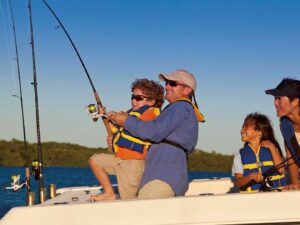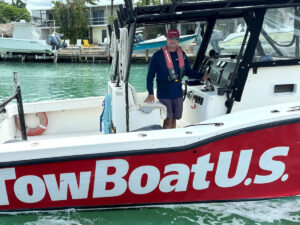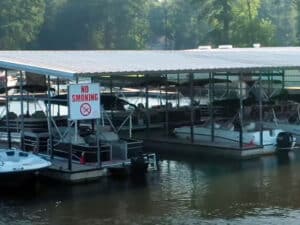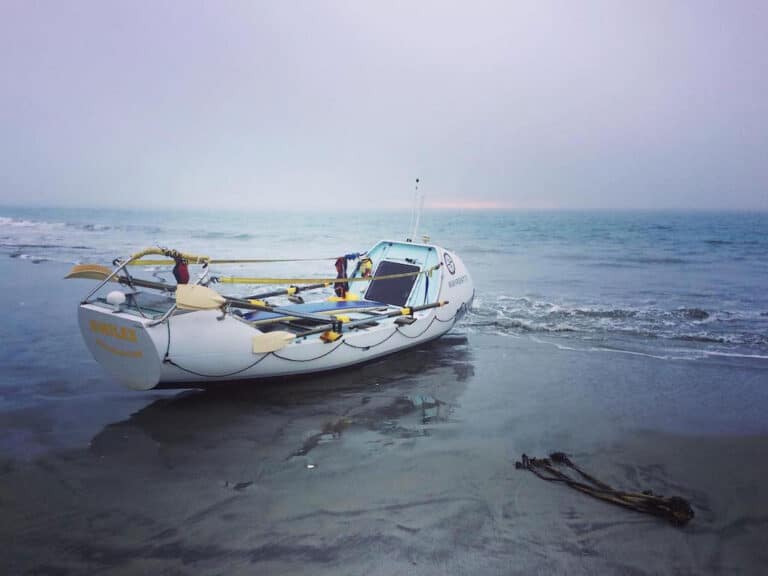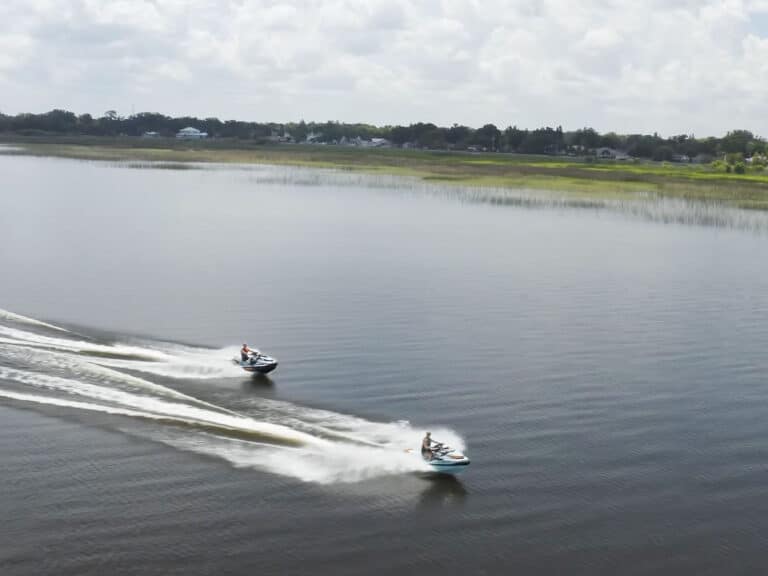Evan, then 18, was heading to a favorite fishing spot on Long Island Sound with friends Ryan Kelly and Luke Voegeli last summer when they heard the call.
“It was ‘Mayday! Mayday! Mayday! Our boat is sinking!’” Evan recalls. Five men were aboard the stricken vessel, all over 70.
“They said that they were in the Six Mile Reef vicinity,” Evan says. “We were like, ‘Wait a second . . . We’re on Six Mile Reef!’”
Scanning the horizon, the teens spotted a boat in the distance. It looked “perfectly fine,” says Ryan, then 17. “That’s why we stress keeping Channel 16 on, because if they didn’t have a radio we wouldn’t have known that they were sinking.”

The older men got into trouble when a wave broke over the stern of their 26-foot center console. The saltwater shorted the batteries, disabling the vessel’s bilge pump. Without power, the engines wouldn’t start either.
The boat continued to take on water as the men repeated their mayday call on VHF Channel 16. When he and his friends arrived to render assistance, Evan recalls, “all five guys shuffled to one side of the boat.” In an instant, the waterlogged vessel turned turtle.
“It’s really scary how fast that happened,” Evan says.
The teens watched as two of the men were thrown clear of the boat and started drifting away. Three others held desperately to the overturned boat. They didn’t know how to swim.
“Basically the only things keeping some of those guys afloat were their life jackets,” Ryan says, noting that all five had donned life vests after their boat began to take on water.
Evan believes that action saved their lives. “If they weren’t wearing life jackets, it would have ended much differently,” he says.
The situation was grave. Five men were in the water, and Evan’s 20-foot Walkaround wasn’t equipped for such a rescue. First, it wasn’t big enough to safely carry three teens plus five waterlogged septuagenarians. And second, it lacked a swim platform or ladder.
“They said specifically, ‘I am not leaving this boat because I don’t know how to swim.’”
— Evan Kamoen
Ryan and Luke, who was 17 at the time, managed to heave the first victim over the transom. But the second man was much larger. Ryan estimates the fisherman weighed more than he and Luke put together, and on top of that, he was exhausted. Despite numerous attempts, Ryan and Luke could not pull him into the boat. So the teens improvised. Evan had already shut down his outboard to eliminate the possibility of a prop injury. Now he asked the man in the water to place his foot on the engine’s lower unit, and used the electric trim to help lift him. That, plus all of Ryan and Luke’s strength, was enough to get the big man safely aboard.
The teens had rescued two people, but three more were still in the water.
Evan worked the radio, requesting backup from other boats on the Sound, while simultaneously restarting the engine and working his way closer to the overturned boat and the three men clinging to it.
“They were holding on for dear life,” he recalls. “And they said specifically, ‘I am not leaving this boat because I don’t know how to swim.’”
Evan and Ryan both attended the Marine Science Magnet High School in Groton, Connecticut, and have been boating most of their lives. Evan earned his boater safety certificate at 12, and recalls his father drilling him “constantly” in boat handling. As soon as he got his driver’s license, Evan spent every possible moment on the water, usually with Ryan and Luke. Now he called on all his experience and skill to bring his boat close alongside the capsized center console. Ryan was able to reach out with a fishing rod, using it to pull two more victims to the transom of Evan’s boat, where he and Luke hoisted them aboard.
By this time, a second boat had finally responded to Evan’s call for assistance on VHF Channel 16. That vessel, Rapala, took the last victim aboard. Another boat was within sight throughout the drama, but never responded. Apparently, its skipper was not monitoring Channel 16.
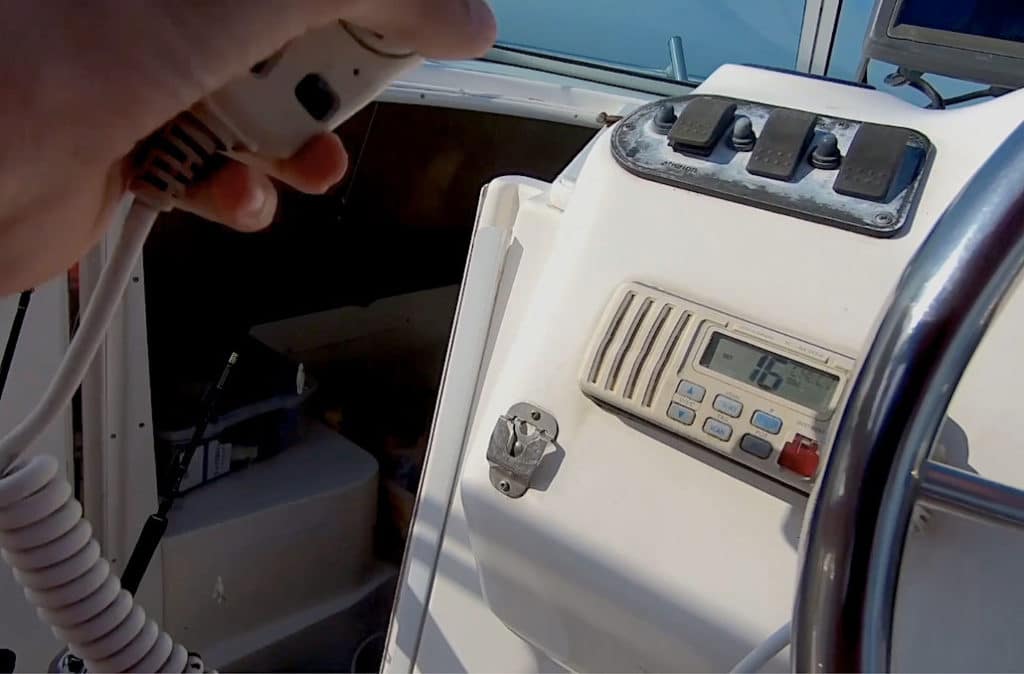
Of all the lessons of the rescue, including the critical importance of life jackets and boater safety training, Evan says the need to monitor Channel 16 stood out the most.
“My dad always told me when I was a kid, always have that radio on Channel 16—no other channel,” he says. VHF Channel 16 is the distress, safety and calling frequency monitored by other vessels and the U.S. Coast Guard.
“I heard the radio call and that was the only thing that had us going towards that boat,” Evan says. “We weren’t going to go over there unless there was a radio call.”
Once the men were safe in Evan’s boat, the mood lightened considerably. Though their boat was on its way to Davy Jones’s locker, they had their life and health, thanks to the trio of quick-thinking teenagers.
The fact that it was one group of close friends helping another wasn’t lost on anyone. “It was kind of weird to think about, because we’re kind of the young guys and we’re saving the old guys. And I could tell they had a friendship kind of like we did,” says Ryan, who will never forget the look in one man’s eyes as he reached out his hand.
“It was just kind of like an in-shock moment where they’re like, ‘Wait, we might have a chance here,’ adds Evan.
When the adrenaline began to wear off, one of the men approached Evan, who works part-time at a tackle shop. “He was like, ‘Wait a second, aren’t you the kid that sold bait to me at the tackle shop?’ and I’m like, ‘Yeah, I was. Long time no see,’” he says.
“It’s a small world.”

